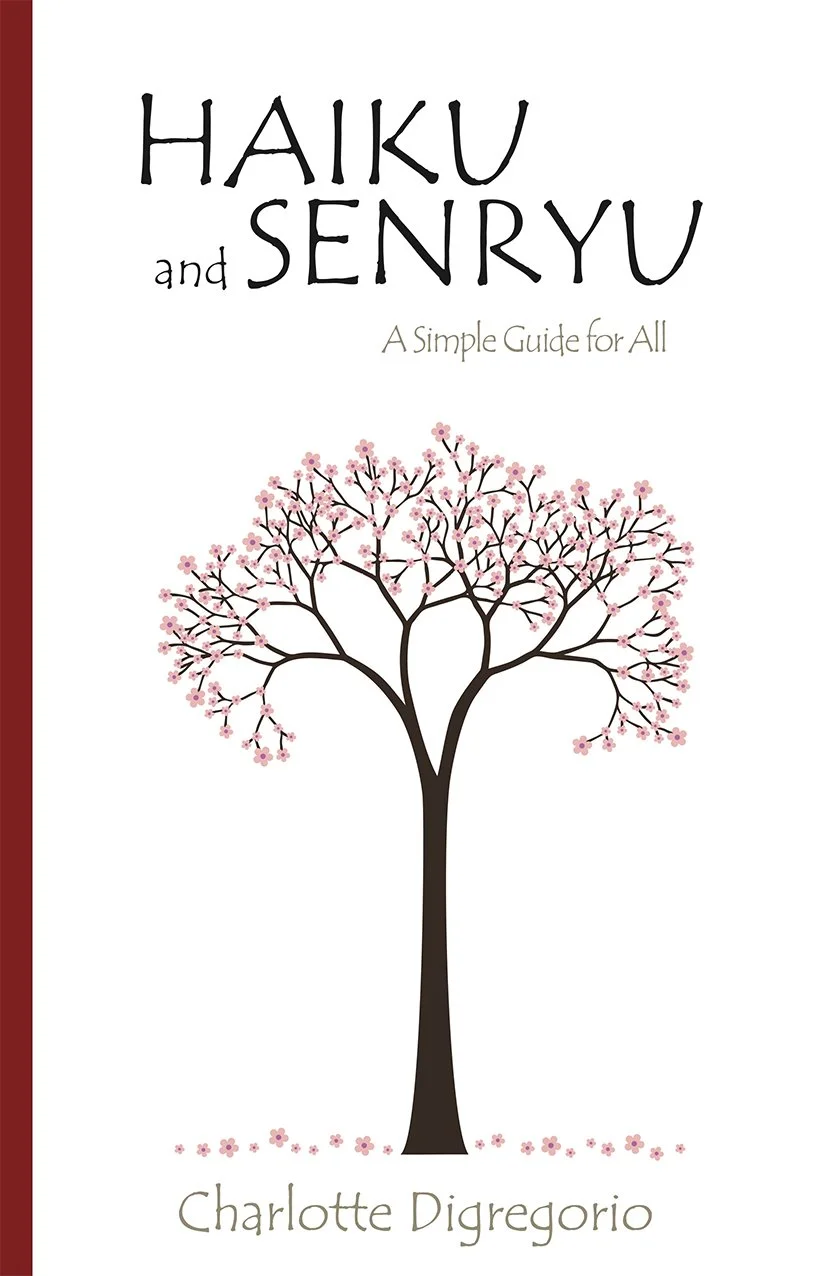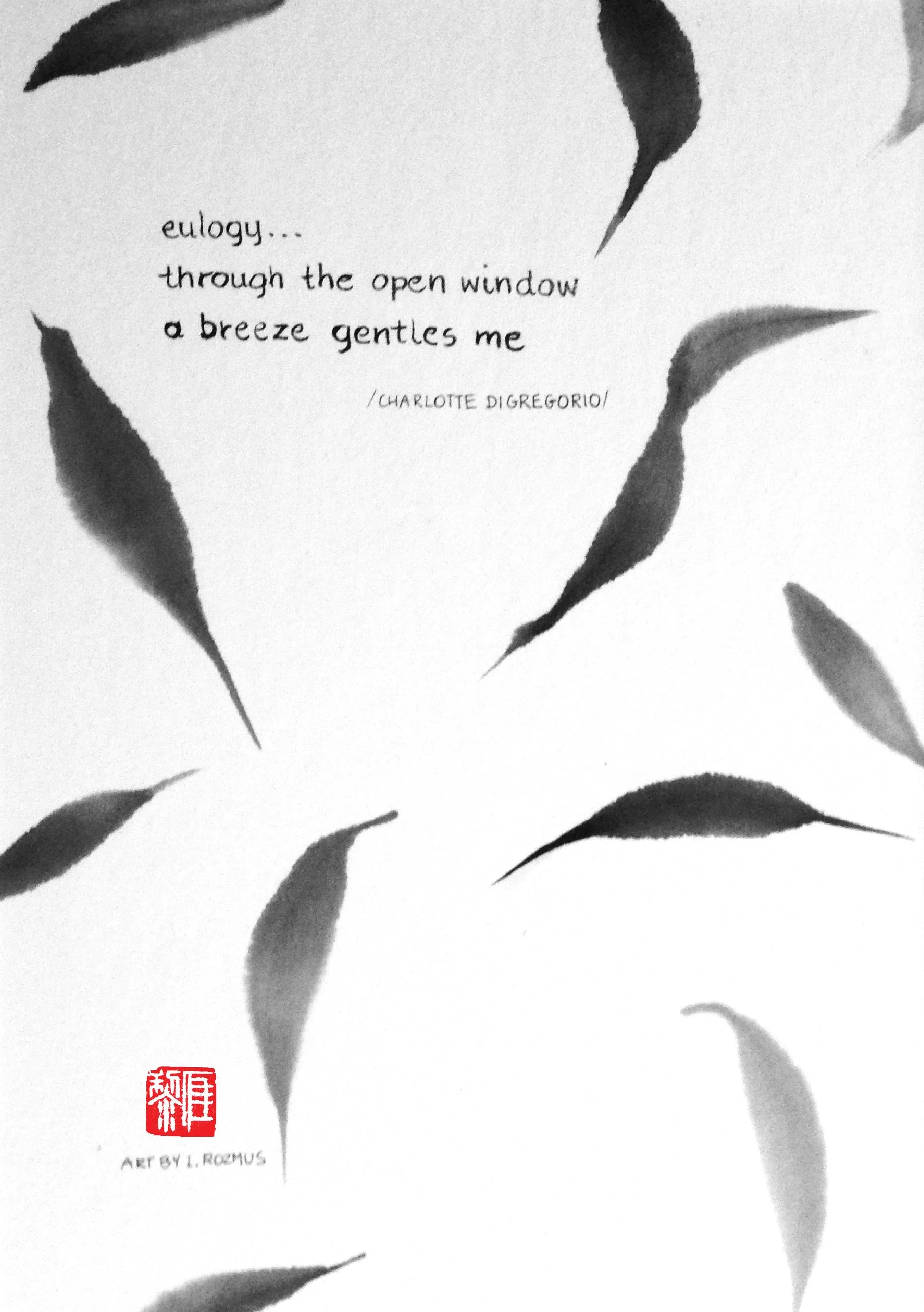In 2014, Charlotte authored Haiku and Senryu: A Simple Guide for All, that is widely recognized as the definitive book for haiku instruction.
January 2023
Charlotte Digregorio, a retired professor and author of Haiku and Senryu: A Simple Guide for All, Ripples of Air: Poems of Healing, and five other award-winning books, writes sixteen poetic forms, has won seventy-three poetry awards, and was nominated for four Pushcart Prizes. She was honored by Illinois Governor Bruce Rauner in 2018 for her decades of achievements in the literary arts. Read more ⟶
When did you begin writing poetry?
I first began writing poetry my Junior year in high school when a visiting poet came to my English class. He singled out two poems that students wrote–one was mine–and he spoke about why they were effective. The college I attended didn’t offer creative writing classes. It wasn’t until my late 20s that I recalled my high school experience and seriously began submitting sonnets and free verse for publication. I discovered haiku in 1995, after I read about Modern Haiku journal in Poet’s Market. I sent away for a sample copy and got hooked on haiku.
What triggered your interest in creating poems?
I first saw poetry as a healing outlet. It has given me a deepened awareness of things to be grateful for. In particular, the brief poems of haiku and senryu (the latter written in the haiku form, but focusing on human nature, rather than nature), allow me to jot down my fleeting moments and thoughts, whether sad or happy. Haiku/senryu keep me focused on simple things that I encounter, such as nature’s beauty or the kindnesses of others that give me reason to pause and appreciate life.
Art of Haiga by Lidia Rozmus / Haiku by Charlotte Digregorio
Who are your favorite poets?
One of my favorite haikuists/senryuists is Robert Spiess. He died in 2002, and is considered the “Dean of English-Language Haiku.” He was a longtime editor of Modern Haiku and authored many collections. Spiess inspires haikuists to write effective imagistic poems through examples of his own stunning, yet understated imagery, just as haiku is meant to have. In addition, Lenard D. Moore, English professor and poet of many forms, is an exceptional haikuist. He’s authored many haiku collections and is a former President of the Haiku Society of America. Further, I enjoy and suggest that haikuists read the collections of Roberta Beary, award-winning and internationally-respected haikuist/author. Moore’s and Beary’s poetry are often featured on my blog that includes “The Daily Haiku,” written by poets from sixty-one countries. www.charlottedigregorio.wordpress.com
What inspires you? Other poets, painting? Music?
Besides daily readings of haikuists worldwide, I’m also inspired to write haiku and other forms by some of my favorite poets like Mark Strand, Ted Kooser, Robert Frost, Donald Hall, and William Carlos Williams. While these poets aren’t haikuists, they write with great insight on life, strong imagery, layers of meaning, succinctness, economy of words, irony, and wit– elements especially relevant in haiku/senryu. Further, art inspires me to write haiku, senryu, free verse, and of course, ekphrastic poems. I often go to museums for inspiration. I have year ‘round exhibits of my illustrated haiku and senryu, known as “haiga” to the Japanese. I hold solo exhibits at libraries, hospitals, corporate buildings, park districts and other venues.
Art of Haiga by Lidia Rozmus/Haiku by Charlotte Digregorio
Where have you published?
I’ve published about 925 poems (including haiku) in journals and anthologies. Poetry books by haiku scholars have included my work. I’ve been published in haiku journals, including: Modern Haiku, Frogpond, The Heron’s Nest, Acorn, Asahi Haikuist Network, Mann’s Library Daily Haiku, Red Moon Press publications, Akita International Haiku Network, The Mainichi, bottle rockets, Shamrock Haiku Journal, and The Haiku Foundation publications. (Aspiring haikuists should investigate these major journals, many found online.) My tanka has been published in Modern English Tanka, Red Lights, Ribbons, and Moonbathing. My other poems have appeared in publications such as: After Hours Journal, Quill and Parchment, Avocet, The Rockford Review, East on Central, Missouri Baptist University English Department journals, The Baltimore Sun, and Wisconsin State Journal.
Art of Haiga by Lidia Rozmus/Haiku by Charlotte Digregorio
Are you in a feedback group that meets regularly? If so, how often?
I’m in a weekly North Suburban Chicago critique group and find it very helpful. As all writers know, we’re often blind to flaws in our pieces, to the point of sometimes even missing glaring errors.
We know every poem is different but–on average–how many revisions does one of your published poems require?
Even with brief forms like haiku and tanka, I write about fifty revisions of each poem over one or two months. A revision can involve just one word, changing the sequence of two lines, or a total overhaul. I’m a great believer in revisions, so that each poem will be the best it can be. I even revise poems after they’ve been published.
Do you gear some of your work toward performance poetry rather than the written form? Why or why not?
I’ve done many poetry readings as a featured poet at haiku conferences. I’ve also participated in a few hundred open mics since 2007. However, I don’t consider myself a performance poet, as I don’t write with the intention of performing a poem. I try to write a poem making it succinct and pleasing to the ear, with assonance, alliteration, and rhythm, whether it’s read by others in a journal or to a live audience. Any well-written poem using an economy of words can be read to an audience.
How long might you struggle with a poem that doesn’t seem to want to come together?
I can struggle with a poem for two years, off and on. I’ve written a few poems that were rejected four times, that were published on my fifth submission. I think it may be easier to revise a poem than to write a new one. I don’t allow any effort to go to waste.
Is there a special person in your life you’re inclined to share your work with? Explain.
No, I don’t share with anyone special. Actually, hardly any of my close friends or relatives are even remotely interested in poetry. When I was younger, my mother used to read my non-fiction books, newspaper and magazine articles. However, she often chipped away at them, critical of my work. After that, I didn’t share with those close to me, unless they specifically asked to read my work. Two of my non-poet friends asked me if they could have copies of my recent books: Haiku and Senryu: A Simple Guide for All and Ripples of Air: Poems of Healing. I bet they keep them out of friendship, but that my books collect dust on their shelves since they’re not interested in poetry!





